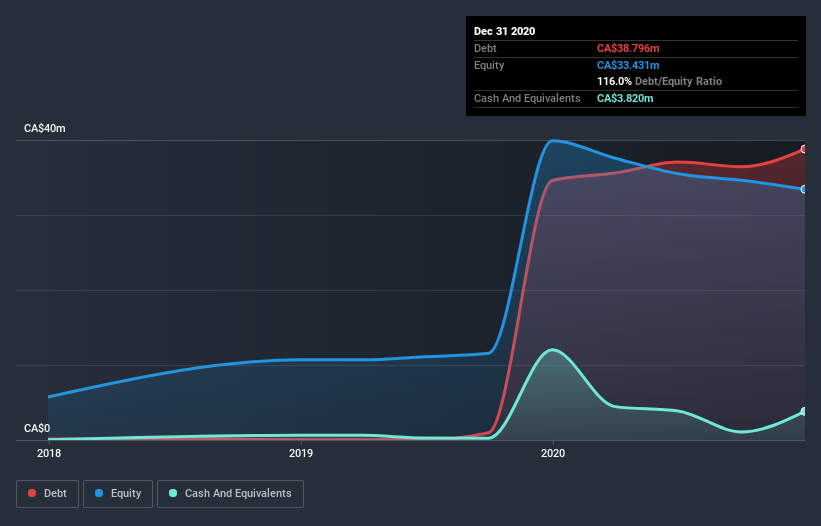
Legendary fund manager Li Lu (who Charlie Munger backed) once said, 'The biggest investment risk is not the volatility of prices, but whether you will suffer a permanent loss of capital.' When we think about how risky a company is, we always like to look at its use of debt, since debt overload can lead to ruin. We can see that Decibel Cannabis Company Inc. (CVE:DB) does use debt in its business. But is this debt a concern to shareholders?
When Is Debt A Problem?
Debt assists a business until the business has trouble paying it off, either with new capital or with free cash flow. In the worst case scenario, a company can go bankrupt if it cannot pay its creditors. However, a more usual (but still expensive) situation is where a company must dilute shareholders at a cheap share price simply to get debt under control. Of course, plenty of companies use debt to fund growth, without any negative consequences. The first thing to do when considering how much debt a business uses is to look at its cash and debt together.
Check out our latest analysis for Decibel Cannabis
What Is Decibel Cannabis's Net Debt?
You can click the graphic below for the historical numbers, but it shows that as of December 2020 Decibel Cannabis had CA$38.8m of debt, an increase on CA$34.6m, over one year. On the flip side, it has CA$3.82m in cash leading to net debt of about CA$35.0m.

A Look At Decibel Cannabis' Liabilities
Zooming in on the latest balance sheet data, we can see that Decibel Cannabis had liabilities of CA$14.3m due within 12 months and liabilities of CA$41.0m due beyond that. Offsetting these obligations, it had cash of CA$3.82m as well as receivables valued at CA$3.83m due within 12 months. So it has liabilities totalling CA$47.7m more than its cash and near-term receivables, combined.
This is a mountain of leverage relative to its market capitalization of CA$59.1m. This suggests shareholders would be heavily diluted if the company needed to shore up its balance sheet in a hurry. When analysing debt levels, the balance sheet is the obvious place to start. But it is Decibel Cannabis's earnings that will influence how the balance sheet holds up in the future. So if you're keen to discover more about its earnings, it might be worth checking out this graph of its long term earnings trend.
In the last year Decibel Cannabis wasn't profitable at an EBIT level, but managed to grow its revenue by 376%, to CA$30m. When it comes to revenue growth, that's like nailing the game winning 3-pointer!
Caveat Emptor
While we can certainly appreciate Decibel Cannabis's revenue growth, its earnings before interest and tax (EBIT) loss is not ideal. To be specific the EBIT loss came in at CA$5.4m. When we look at that and recall the liabilities on its balance sheet, relative to cash, it seems unwise to us for the company to have any debt. Quite frankly we think the balance sheet is far from match-fit, although it could be improved with time. However, it doesn't help that it burned through CA$8.5m of cash over the last year. So suffice it to say we consider the stock very risky. There's no doubt that we learn most about debt from the balance sheet. However, not all investment risk resides within the balance sheet - far from it. To that end, you should learn about the 3 warning signs we've spotted with Decibel Cannabis (including 1 which doesn't sit too well with us) .
When all is said and done, sometimes its easier to focus on companies that don't even need debt. Readers can access a list of growth stocks with zero net debt 100% free, right now.
When trading Decibel Cannabis or any other investment, use the platform considered by many to be the Professional's Gateway to the Worlds Market, Interactive Brokers. You get the lowest-cost* trading on stocks, options, futures, forex, bonds and funds worldwide from a single integrated account. Promoted
New: Manage All Your Stock Portfolios in One Place
We've created the ultimate portfolio companion for stock investors, and it's free.
• Connect an unlimited number of Portfolios and see your total in one currency
• Be alerted to new Warning Signs or Risks via email or mobile
• Track the Fair Value of your stocks
This article by Simply Wall St is general in nature. It does not constitute a recommendation to buy or sell any stock, and does not take account of your objectives, or your financial situation. We aim to bring you long-term focused analysis driven by fundamental data. Note that our analysis may not factor in the latest price-sensitive company announcements or qualitative material. Simply Wall St has no position in any stocks mentioned.
*Interactive Brokers Rated Lowest Cost Broker by StockBrokers.com Annual Online Review 2020
Have feedback on this article? Concerned about the content? Get in touch with us directly. Alternatively, email editorial-team (at) simplywallst.com.
About TSXV:DB
Decibel Cannabis
An integrated cannabis company, engages in the cannabis cultivation, processing, and sale of cannabis flower products in Canada.
Undervalued with reasonable growth potential.


